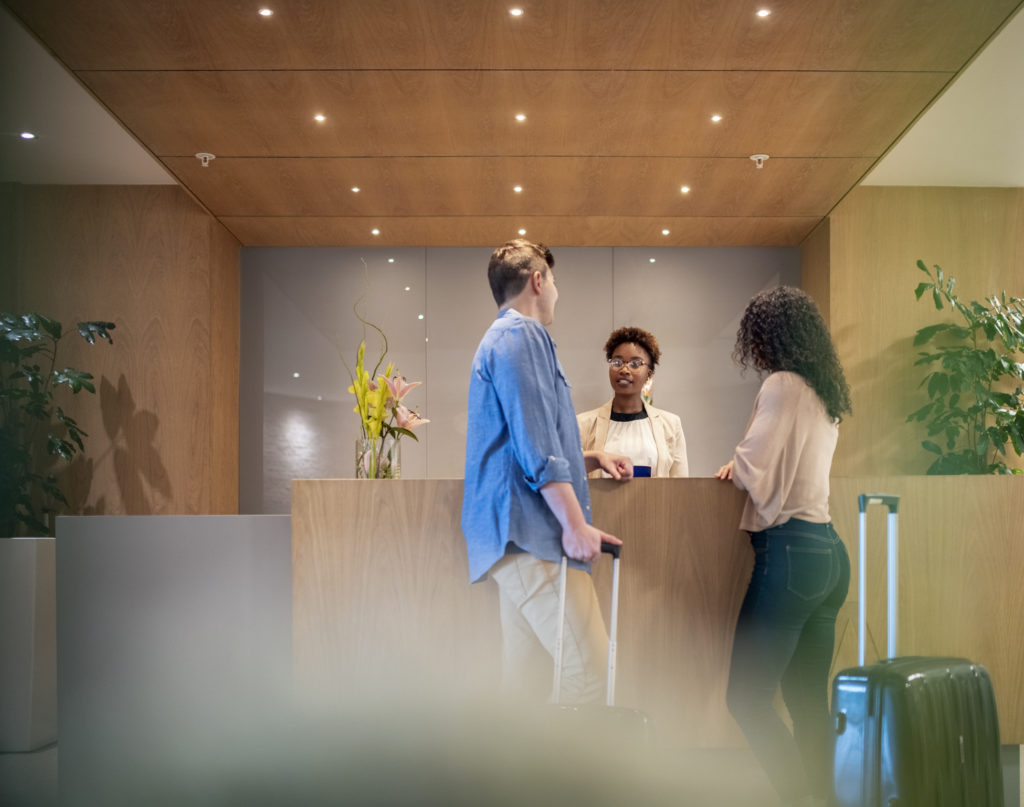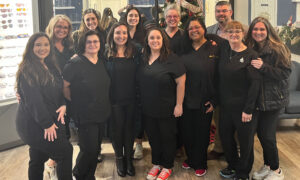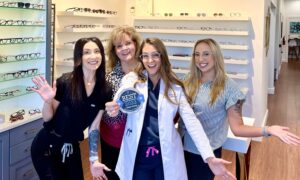By Jennifer Jabaley, OD

January 16, 2019
As optometrists, we strive for an atmosphere in which our employees and managers serve patients effectively and eagerly. In previous columns, I have examined the elements of the culture at topnotch corporations such as the Ritz-Carlton Hotel chain and Chick-fil-A restaurants, that makes customer service not only consistent and effective, but a corporate way of life.
Inside Ritz-Carlton hotels, as well as Chick-fil-A restaurants, all employees have been trained to operate with similar themes: pride, a pitch-in-where-needed philosophy, continuous training and empowerment.
Now, I want to talk about a different type of service training, focused on managing body language, that at first glance might seem offbeat, but examined further, makes brilliant sense.
Poised & Graceful Employees
Have you ever stayed at a JW Marriott hotel or resort? Did you notice anything unique about its employees? Was it obvious to you that the people who checked you in made consistent eye contact, had an engaging smile, held their shoulders back and head high with poise and grace? That’s because a few years ago, the JW Marriott brand began a training program called Poise and Grace, focused on body language and how it relates to service, marketing and communication.
“In many cases, service is even more important than the product,” says Christy Donato, senior director and global brand leader for JW Marriott hotels and resorts. (Forbes.com, September 2016) The Poise and Grace program was implemented as a way for JW Marriott to differentiate its service from other luxury hotels. Donato said they looked at their competitors and it was a sea of sameness. Experience is what people are looking for, but every high-end resort or hotel offered a beautiful pool, a luxurious spa, high-end restaurants.
All employees in hospitality are trained to use manners and be attentive. They realized that not just service, but service style, would be a way to differentiate their brand. They wanted to implement a specific style of service that enhanced human connection and created memorable experiences. This would be remembered far longer than the shape of the pool.
Other Articles to Explore
Your Service Differentiates Your Practice
Isn’t this so similar to optometry? While size and design of different offices may vary, ultimately aren’t most offices a front desk, reception room, exam rooms and an optical? Will our patients remember how many frame boards we have, or will they remember how graceful and poised the optician was as she selected the perfect pair of glasses and slid them on the patient’s face?
So, how did JW Marriott train their employees to provide exceptional, memorable service? JW Marriott decided to craft an internal training initiative to teach employees body language traits and how those traits relate to service, marketing and communication. The company believed that body language, focused specifically on teaching employees to exhibit finesse and grace as a part of their daily routines, would result in a refined guest experience.
The Poise and Grace program began with a local partnership with the Joffrey Ballet in Chicago. Ballet? Why ballet?
They did not set out to teach JW Marriott employees to be ballet dancers. “We’re not asking them to do pirouettes or split jumps,” explains Mitzi Gaskins, vice-president and global brand manager of JW Marriott Hotels and Resorts (Skift.com 2016). “It’s about giving our staff the tools to say, ‘when I am in front of the guests, I am on a stage. How can I deliver an amazing experience and engage with my audience with poise and grace?’”
The Poise and Grace program incorporates 15-minute exercises that cover everything from breathing, posture, eye contact and flow of movement. There’s an emphasis on embracing a stage presence at all times, even under trying circumstances. The staff learns how to use breath to regulate speech patterns, and proper flow of movement to navigate around tight spaces. These principles could certainly be applied to an optometric staff maneuvering patients around the packed reception room or optical, or the front desk answering tough financial questions or dealing with an unhappy patient.
Body Language Makes an Impact
Agility, whether it’s working in a restaurant, hotel or optometry office, makes for a more conscientious form of service. Practicing things like good posture – shoulders back, chin up — a proper handshake, and smooth speech patterns leaves a lasting impression. Exhibiting finesse and gracefulness throughout all aspects of your practice will result in an elevated patient experience.
According to Harvard researcher and TED speaker, Ann Cuddy, poise, posture and body language matter. People form an impression of capability and leadership qualities in as little as 30 seconds based mostly on nonverbal traits such as eye contact, hand and facial gestures and body movement.
I’m not suggesting we partner with local ballet companies to train our staff. I am, however, making the suggestion that first, we educate our staff and ourselves on the importance of body language. Drive home the point that patients’ first impressions of the office happen the minute they walk through the front door and are greeted. Impressions solidify as the technicians pick up patients in the reception room and escort them to the pre-testing area.
By the time the doctor walks into the examination room, the patient has already made contact with at least two members of the team and have begun to form lasting impressions of the office. Slumped shoulders and mumbled speech can leave an impression that an employee is not happy to be working in that office. Conversely, staff members who appear self-assured and proud, graceful and content, lend an atmosphere of serenity and confidence.
What if your practice didn’t just meet expectations, but provided an experience that stood above and beyond simply by providing service with poise and grace?
Perhaps begin with a staff meeting where you show your team this TED talk about body language, “Your Body Language May Shape Who You Are.”
Have you trained your employees to be conscious of the impact of their body language on communication with patients? What ideas do you have for incorporating the training lessons from JW Marriott into the training of your own employees?
 Jennifer Jabaley, OD, is a partner with Jabaley Eye Care in Blue Ridge, Ga. To contact her: jabaleyjennifer@yahoo.com
Jennifer Jabaley, OD, is a partner with Jabaley Eye Care in Blue Ridge, Ga. To contact her: jabaleyjennifer@yahoo.com

























